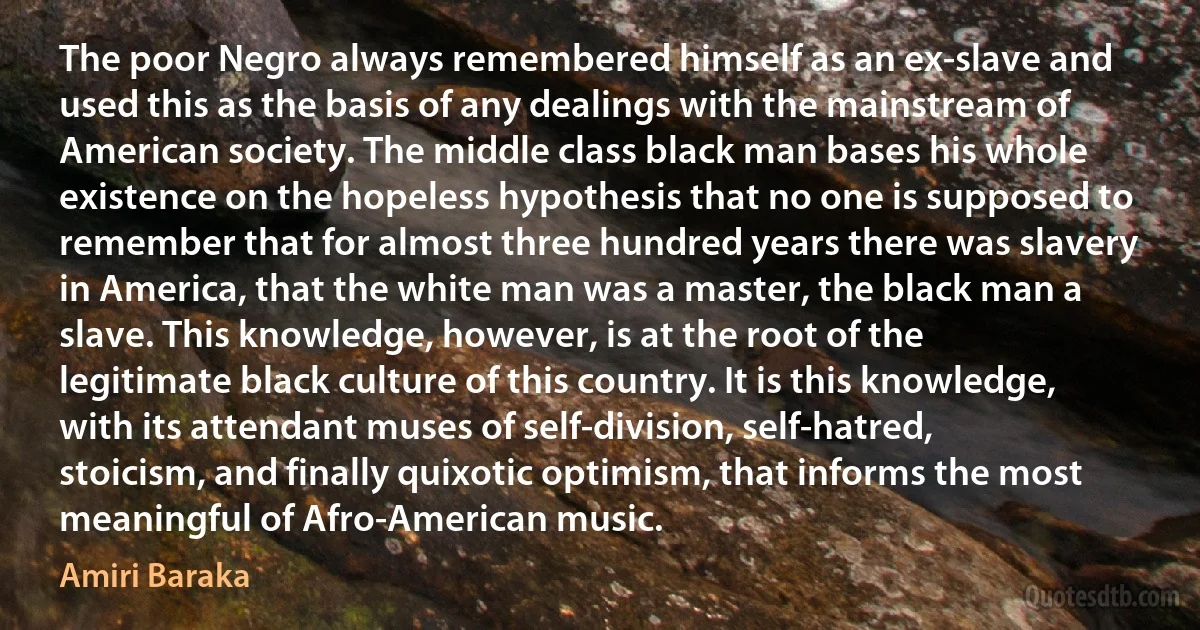
The poor Negro always remembered himself as an ex-slave and used this as the basis of any dealings with the mainstream of American society. The middle class black man bases his whole existence on the hopeless hypothesis that no one is supposed to remember that for almost three hundred years there was slavery in America, that the white man was a master, the black man a slave. This knowledge, however, is at the root of the legitimate black culture of this country. It is this knowledge, with its attendant muses of self-division, self-hatred, stoicism, and finally quixotic optimism, that informs the most meaningful of Afro-American music.
Amiri BarakaRelated topics
almost base black country hundred hypothesis knowledge man master middle music poor quixotic root slave stoicism three white dealings years Afro-American mainstream self-hatredRelated quotes
Anxiety occurs because of a threat to the values a person identifies with his existence as a self ... most anxiety comes from a threat to social, emotional and moral values the person identifies with himself. And here we find that a main source of anxiety, particularly in the younger generation, is that they do not have viable values available in the culture on the basis of which they can relate to their world. The anxiety which is inescapable in an age in which values are so radically in transition is a central cause of apathy ... such prolonged anxiety tends to develop into lack of feeling and the experience of depersonalization.

Rollo May
A mental shortcut becomes almost irresistible and maybe even rational by some lights. The two young black men on one side of the street look like so many others the officer has locked up. Two white men on the other side of the street-even in the same clothes-do not. The officer does not make the same association about the two white guys, whether that officer is white or black. And that drives different behavior. The officer turns toward one side of the street and not the other. We need to come to grips with the fact that this behavior complicates the relationship between police and the communities they serve.

James Comey
The bourgeoisie today is a falling class. ... By its imperialist methods of appropriation [it] is destroying the economic structure of the world and human culture generally. Nevertheless, the historical persistence of the bourgeoisie is colossal. It holds to power, and does not wish to abandon it. Thereby it threatens to drag after it into the abyss the whole of society. We are forced to tear it off, to chop it away. The Red Terror is a weapon utilized against a class, doomed to destruction, which does not wish to perish. If the White Terror can only retard the historical rise of the proletariat, the Red Terror hastens the destruction of the bourgeoisie.

Leon Trotsky
Your favour of July 31, was duly received, and was read with peculiar pleasure. The sentiments breathed through the whole do honor to both the head and heart of the writer. Mine on the subject of slavery of negroes have long since been in possession of the public, and time has only served to give them stronger root. The love of justice and the love of country plead equally the cause of these people, and it is a moral reproach to us that they should have pleaded it so long in vain, and should have produced not a single effort, nay I fear not much serious willingness to relieve them & ourselves from our present condition of moral & political reprobation.

Thomas Jefferson
The War of the Roses in England and the Civil War in America were both intestinal conflicts arising out of similar ideas. In the first the clash was between feudalism and the new economic order; in the second, between an agricultural society and a new industrial one. Both led to similar ends; the first to the founding of the English nation, and the second to the founding of the American. Both were strangely interlinked; for it was men of the old military and not of the new economic mind - men, such as Sir Humphrey Gilbert and Sir Walter Raleigh - who founded the English colonies in America.

J. F. C. Fuller
